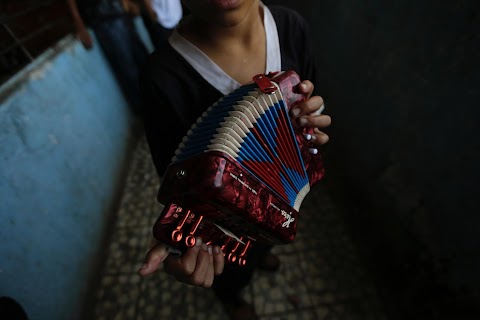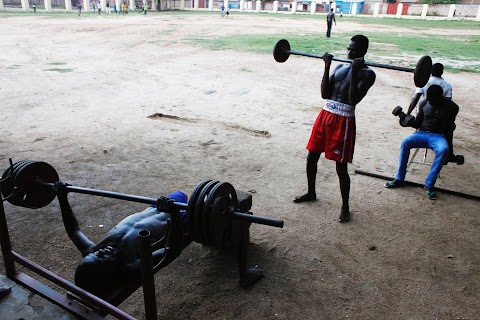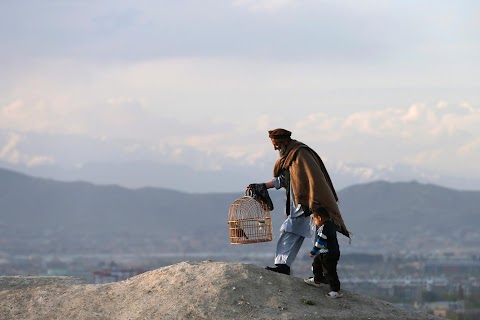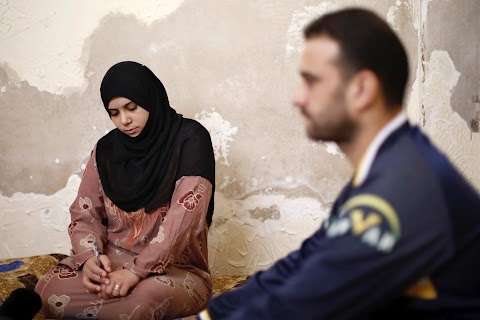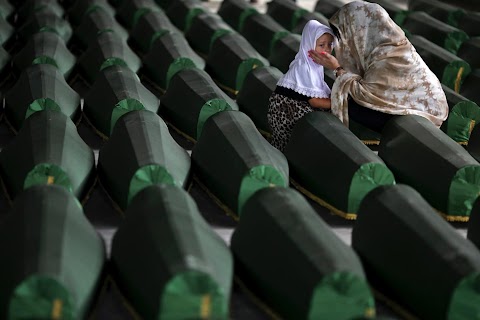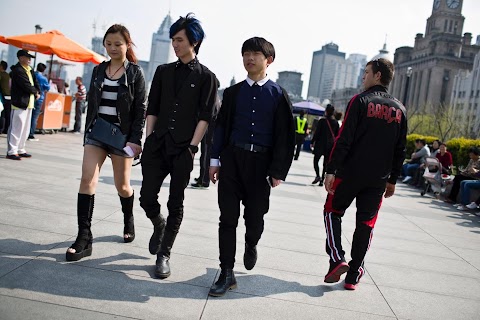
Uighurs of Shanghai
Three Han Chinese youths, part of China’s majority ethnic group, stroll past a man from the country’s Uighur minority.
The traditional home of the mostly Muslim Uighurs is China's restive Xinjiang region in the remote far west of the country. But some Uighurs have moved elsewhere in China, including thousands resident in Shanghai.

A Uighur mother and her children are reflected in the window of a vehicle as they head to the train station to make the journey back to Xinjiang.
The far western region has been beset by violence, blamed by the government on Islamist militants and separatists who want to establish an independent state called East Turkestan. About 200 people have died in unrest in Xinjiang in the past year or so.
Exiled Uighur groups and human rights activists say that the government's heavy-handed policies in Xinjiang, including controls on Islam, have provoked unrest.
Beijing rejects this claim and China's Communist Party says it protects freedom of religion, but it maintains a tight grip on religious activities and allows only officially recognised religious institutions to operate.
In Xinjiang, state media reports of official notices have emerged, demanding that party members, civil servants, students and teachers not observe Ramadan.

Ali, a 25-year-old Uighur man, came to Shanghai 15 years ago and makes a living selling kebabs from a food stand.
He says that, while people are happy to come and buy his wares, they seldom talk to him about anything but the price.
“I think it’s because we somehow look dangerous in their [the Han people’s] eyes,” he said.

According to a government website, there were 5,254 Uighur residents in Shanghai as of 2010.
Several of those who photographer Aly Song spoke to said that they felt they were treated with some suspicion by the Han majority.
However, they continue with their daily lives in Shanghai, including working and practicing their religion. One woman told Song she felt there was more freedom in Shanghai than in Xinjiang.
Slideshow

Uighur men visit the Shanghai waterfront.

A Uighur man entertains a Han boy by doing hoola hoops on the street.

A group of Uighur women walk through downtown Shanghai.

A Uighur man takes a nap after lunch at his restaurant.

Muslim children exercise at a local mosque.

Uighurs pray outdoors at a mosque in Shanghai.

An ethinic Han Chinese man looks at Uighurs as they pray.

A ethnic Han woman walks past a group of Uighurs.

Uighur children play at the entrance of their residential compound.

A Uighur family spends an evening at their home.

A Uighur man looks at a photograph on a mobile phone as his family eat a meal together.

A Uighur man feeds a young child.

An infant sleeps in a hammock.

Family members play with each other.

A photograph of a Uighur family lies on the carpet of their home.
"Life can be difficult for migrant workers of all backgrounds, but it seems particularly hard for Uighurs."The traditional home of China’s Muslim Uighur community is the far western state of Xinjiang, a region that has been plagued by violence in recent years.
The government blames a series of attacks on Islamist militants and Uighur separatists, who it says want to set up an independent state called East Turkestan. But human rights activists say that government policies - including restrictions on Islam - have stirred up the unrest, although the government strongly denies this.
Some members of the Uighur community have chosen to move elsewhere around the country and Shanghai, the city where I am currently based, had 5,254 Uighur residents as of 2010, according to a government website.
Life can be difficult for migrant workers of all backgrounds, but it seems particularly hard for Uighurs.
Their distinctive features, their different language and their religion all make them stand out among the majority Han Chinese, and they can suffer discrimination from those who associate them with the violence centred on Xinjiang.
I spoke to Ali, a Uighur father of two, who came to Shanghai with his parents 15 years ago and who now makes a living selling kebabs from a food stand.
“People love my kebab. Some of them come often and order a lot, but they seldom speak with me about anything but the price,” he said. “I think it’s because we somehow look dangerous in their [the Han people’s] eyes.”
I also met Nuyiman, a 34-year-old Uighur woman who has been a kebab vendor here for 10 years.
She is very positive about the city: “Shanghai has all the good stuff. Nice weather, nice people. It is even a safer place to live than Xinjiang and here my family can make enough money to support ourselves,” she told me.
“Every day, I feel like I am the happiest woman in the world as I come back to my place from work, seeing my children playing around and watching them watching cartoons,” she said.
Yet all is not perfect. The home that Nuyiman is grateful for is a rented room that measures just 20 square meters (215 square feet) and which she shares with her husband, her four children, and her little sister. It is significantly smaller than the average per capita housing space in the city, which was 34.4 square meters in 2013, according to local reports.
But, of course, not all Uighurs in Shanghai live on a shoestring. I also interviewed a college student named Anuer, who has no real financial difficulties. She is proud of her collection of colourful headscarves, but during the roughly two decades that she lived in her hometown, she was not allowed to wear a headscarf to school. Now, she can use them as she likes.
“Shanghai has more freedom than Xinjiang,” she told me, saying that this was one of the things she loved best about the city.
As a student with a tight course schedule, Anuer sometimes isn’t able to pray five times a day. But most of the other Uighurs I met said that they did so, and also went to mosque every Friday. Han people, who walk past as they worship, sometimes stop to look at them before going on their way.
“I can tell the fear in Han’s eyes sometimes, when I am around them on a bus,” a Uighur told me during an interview. Others said the same thing. They seemed to agree that the problems started in 2009, when ethnic rioting broke out between Uighurs and Han Chinese in the Xinjiang capital Urumqi. Nearly 200 people were killed as locals took to the streets, burning and smashing vehicles.
Now, as we talked about the Uighurs’ feelings of estrangement, one woman told me: “despite our differences and everything that happened, I always hope we could live like a family with Han people.”
I wish for the same thing, but right now the future looks tough.
]]>
A young Uighur man smokes in the street.



